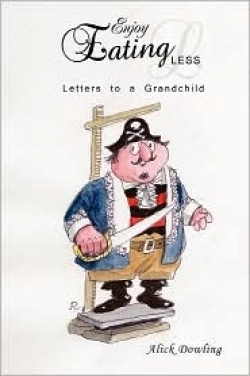Enjoy Eating Less
Letters to a Grandchild
In the first few pages of his short book, Enjoy Eating Less, Alick Dowling cuts right to the chase by stating that being fat is not a medical issue, but a moral problem. By the end, he uses even stronger words: that fat people aren’t addicted to food, they’re addicted to eating. He reminds readers that while gluttony used to be considered one of the “seven deadly sins,” the medical community now considers it a behavioral problem. And the way Dowling sees it, the worldwide obesity epidemic is the result of one simple problem: people consume much more than they need.
He believes the only cure for obesity is a “non-dietary eating less” program, which does not prohibit certain foods or count calories, but advocates cutting portion sizes in half. After Dowling himself used the method to lose and keep off forty-four pounds, his college-age granddaughter wrote to him for weight-loss advice. Enjoy Eating Less compiles the twenty-four letters he wrote to her, in which he outlines his commonsense application of portion control.
As he reveals in the first letter, his program has three basic principles: 1) Eat what you like, but much less of it, 2) Avoid extremes, and 3) Take responsibility for yourself. Dowling, a retired British doctor who worked in Preston, Liverpool, and from 1950 in a Bristol group practice until retirement in 1995, believes that the personal letter format is more effective than the Department of Health’s generalized methodologies for faceless average citizens.
According to Dowling, there are two types of hunger: physical and psychological. Thanks to snacking and the wide availability of food, physical hunger is rarely experienced anymore and is easily satiated with a small portion of food. On the other hand, psychological hunger tricks the mind by increasing appetites for a particular food. The only cure for these ghostly hunger pangs is distraction, Dowling says.
And, in possibly the greatest departure from general weight-loss advice, Dowling does not promote exercise. Instead, he states that workout routines are often an excuse to overeat later. He also points out that exercise is often counter-productive as it can increase appetites.
While Dowling’s advice and reasoning is sound, for most of the book, he is vaguely critical about more conventional weight-loss programs without much detail. He finally targets specific regimens in Letter 18, and his criticisms of how diets such as Atkins do not work are the most convincing of the entire book.
Audiences outside of Britain may feel alienated by Dowling’s references to weight in stones and by his mention of specific Lords. What’s more, the cover art—an illustration of a chubby pirate—is ill-matched for Enjoy Eating Less, a collection of correspondence between grandfather and granddaughter.
Overall, Dowling’s commonsense approach to weight loss is refreshing. For those who suffer with added pounds, his technique is empowering as it places control in the individuals’ hands and on their plates as opposed to personal trainers, doctors, and pharmacies. And Dowling not only simplifies a widespread epidemic, his tough love approach is stern enough to jolt readers out of mindless eating routines, causing them to really think about what they’re putting into their bodies.
Reviewed by
Amanda McCorquodale
Disclosure: This article is not an endorsement, but a review. The publisher of this book provided free copies of the book and paid a small fee to have their book reviewed by a professional reviewer. Foreword Reviews and Clarion Reviews make no guarantee that the publisher will receive a positive review. Foreword Magazine, Inc. is disclosing this in accordance with the Federal Trade Commission’s 16 CFR, Part 255.

